- Home
- Marge Piercy
He, She and It Page 12
He, She and It Read online
Page 12
“Killing is wrong,” the Maharal begins, but then the Golem had been created to protect. “You should use no more force than is necessary at any given time.”
“But I did protect you. Now they can’t talk of who came out of the ghetto tonight.”
“But their bodies outside the wall will call attention to the secret exit. Jews will be blamed for the murder. The idea, Joseph, is to save us from trouble, not to get us into trouble.”
“Let him take them to the river and throw them in. There will be nothing to connect them to us,” Yakov says. “I’ll go with him, Rabbi. Wait inside.”
Itzak and the Maharal hide in the bushes, waiting. Already the sky is streaked with the pale gray of predawn, not as if light came but as if the darkness were wearing through. The wind picks at them more bitterly, knifing through their clothes. The Maharal feels faint. He leans against Itzak. His long fasts have caught up with him.
Itzak takes advantage of the Maharal’s weakness to say, “Teacher, perhaps this was a mistake. We could easily return him to clay right now, and no one would ever know. No one but us has seen him.”
“Except for the watchmen,” Judah says quietly. The murders have shaken him deeply. Of course he has seen people executed in the square or set upon by ruffians and murdered; these are violent times, and no one with eyes can avoid seeing fresh corpses. But he feels implicated in this crime, and that is new and disturbing.
“Maharal, we can send him back to clay. As if he had never been.”
Judah musters enough strength to pull himself upright. In a few moments he will collapse in his own warm bed and Perl will minister to him. Perl will be waiting, he knows. She will scold him for wearing himself out, for staying out all night, for starving himself. She will feed him warm soup, she will bring a warm brick to his bed and wrap him in a goose-down comforter. He will be warm, and he will sleep. “What I have done is proper. I was given a vision and told what to do. He is our defender. He’ll learn. And he’s obedient. We must simply be careful what we tell him to do—be precise, be careful exactly what we say. Because what we order, he will carry out.”
The Maharal is unsure if he is truly glad to see the Golem striding out of the thinning darkness or if he had secretly hoped that the Golem had vanished into the night and only Yakov would return.
“Joseph,” the Maharal begins as soon as they are safely inside. “Killing is wrong. You were created to keep the peace for us.”
“I protected you. The way I must.” The Golem stands there flat-footed, patient. He looks as if he could stand all day just staring at the walls, at the stones of the narrow twisty street. The houses of the poor are built of whole logs; the fancier houses of dressed timber or stone. Everything fascinates him: a cat slithering over a wall to safety, a few blades of grass pushing out between paving stones. “Why are you angry at me?”
“You must be more careful, Joseph. Your strength is great, but your mind is weak.”
“Maybe it can grow, Teacher. Maybe my mind can be strong too. But I must keep you safe.”
Thus begins the service of the Golem to the Jews of Prague, while the Maharal is filled with bitter doubt. What has he summoned to life? What violence has he loosed on the world? He is a man of peace. He wants only to protect his flock. All the violence of his life has been verbal. The prayers he leads in the synagogue speak constantly of peace—Shalom, Shalom—although for the Jews peace seldom lasts. What peace they know is the peace of the few without power or weapons surrounded by the many with both. Thaddeus is preaching against them every week. The powerful crafts guilds have already claimed one victim, Chaim the Silversmith, whose mangled body, every nail torn off, eye dangling on his smashed cheek, toothless gums, battered feet, he can close his eyes and see, unwillingly. No one leaving the ghetto misses experiencing insult and sometimes random attacks in the streets of the city. Something is seething, something that lives like a tick on warm fresh blood.
Judah has fought his rabbinical rivals with words. With words he demolishes their arguments, with words he slashes at their work of words, their books, their circulated manuscripts, their sermons and lectures. With words he created this golem. But this monster does not fight by throwing words.
ELEVEN
He, She and It
Yod’s eyes were strange, she thought, although the color was ordinary enough, a brown lighter than her eyes with flecks of green in the large iris. But the eyes fixed her with an unblinking and piercingly curious stare, beady, hard, like that of a hawk. If the cyborg had been a large cat or a very large bird, she would have imagined it wondering if this thing that was her would be good to eat. While it was awaiting input, did it have thoughts in any sense a human could understand? Did it not rather simply sit vacant as any other machine before the command to start up?
Yod had a presence, perhaps what Malkah had meant by calling it a person. Gimel simply was, with no more impact than a cleaning robot or a beverage cart. Yod, however, created a set of demands simply by fixing her with those hungry eyes and expecting…what? Knowledge, attention, information to devour: after all, that was what she was here to impart. But she would not think of it as a kind of overgrown child to whom she was acting as governess.
She started, however, as she would have with a child, with a battery of tests. For the rest of the day she administered the common sets. By noon she was tired, although of course Yod was not. It would have sat and happily taken tests for a year, she suspected. Answering questions and summoning information was one of its functions, and it could do it forever. How Gadi had hated exams. Avram had in a sense created the student he had wanted and not gotten in his son: a learning machine. In some aspects of intellectual development and ability, Yod scored vastly above the human range; in others, it was well within ordinary human parameters. It was like a bright child, perhaps the sort of child Josh had been, forward in its command of the sciences and of mathematics but quite retarded in its grasp of human relationships and the subtler values. Metaphorical thinking seemed to stymie it. It tended to interpret discourse literally.
On their second day together, she began where she had left off: with metaphorical thinking, the ability to create analogies. She administered a simple test designed for very young children. His score was zero.
She tried on Yod the Robert Burns lyric:
O, my luve is like a red, red rose
that’s newly sprung in June.
O, my luve is like the melodie
That’s sweetly play’d in tune.
It was a washout. “He was a botanist? A musician?”
“Yod, think of a rose.”
“A rose is a flower closely related to a number of edible fruits. Sometimes its hips are eaten as soup or jelly, but usually they were harvested in the past by birds. Roses are a common gift to show affection. They possess color, fragrance, form—”
“Have you ever seen a rose?”
“In the dictionary program.”
“I mean a real rose.”
“No.” Yod managed to imitate regret in its deep voice.
“There are roses growing along the south side of this building, old pillar roses, red and pink. Haven’t you ever noticed them?”
“I’ve never seen the outside of this building.”
“You’ve never been out of the lab?”
“I’ve been in Avram’s flat, before Gadi came to visit. Almost every night I go down to the basement, where Avram has set up a gym. There I practice my martial arts with Gimel. He’s sufficient to give me a challenge I couldn’t get from a human partner.”
“But you’ve never been outside?”
“Never. Avram always says I am not ready. Can you make me ready?”
“I don’t think you’ll ever get ready if we stay in the lab. I’m going to take you out right now, to my house.” It occurred to her that Avram would be furious, but she had to proceed in her own way. “Now, on the street we have only two blocks to walk—you know what a block is?”
“Th
e plan of the town is in my memory.”
“While we’re outside, you walk beside me and keep your mouth shut.”
Yod shut its mouth tightly, as if keeping a large mouthful inside.
“I don’t mean that literally. I mean you should not speak to anyone beyond saying hello if anyone speaks directly to you. If I have to introduce you, your name is…Yod Oblensky. You’re a cousin of Avram’s. I’ll do all the rest of the talking. Do you understand?”
It grinned so widely its face seemed to split open. “Thank you, Shira. I’ve longed to go outside. I think about it every day. I even considered going quietly on my own, but Avram locks me in and I’m not willing to break the lock.”
“Could you? That’s a very high-security lock.”
“I could break it.”
She was startled by Yod’s confessing that it had thought of disobeying Avram. She had always understood that a robot could not disobey. After all, it had not done so, but that it could even frame such a possibility astonished her. She had to find out quickly how real its apparent ability to master new situations was and how much it was capable of learning that went beyond the collection and regurgitation of facts. Taking Yod out was the first procedure in her exploration of its true capacity.
As she had expected, at this time of the morning few people were on the streets. It was a third of the way into the average workday, and even people who worked a split shift or who went to work early or late were all on the job. Children were in day care or in school. Only a street-cleaning robot came rattling along the street, stopping to pick up trash and sweep.
As it came up level to them, it darted forward to spear a piece of debris. Instantly Yod flung himself upon it, seized it, smashed it against the curb. The curb cracked with the impact. “Yod! That’s a street cleaner. Come. Quickly. I don’t want to have to explain this.”
Yod bent over the mangled mechanism. “It could have been a bomb. I see now. A cleaning mechanism?”
“How do you feel when you see such a mechanism? Do you feel a sense of kinship?” She must be losing her mind, asking a machine how it felt.
Yod rose to rejoin her. When it was not in its security mode, it moved with surprising grace. “Do you feel a sense of kinship when you eat telapia?”
“Why should I?”
“You’re as closely related biologically to that fish as I am as a mechanism to that cleaning robot. Perhaps you’re closer.”
She glanced sideways at Yod. “Put me in my place, didn’t you?”
“Your place?” Gingerly it took her by the shoulders. “Your place is at the end of the street, correct?”
“I was speaking metaphorically. Do not actually put me anyplace. Just walk on, please.”
The cyborg was craning around, swinging suddenly to survey the street behind them. Suddenly it sprang into attack posture.
“You’re going to have to learn to use metaphor and simile, Yod, if you’re ever to sound halfway human. By the way, that’s a dog. It is not an attack dog. It’s called a spaniel, and it’s friendly.”
“This incessant comparing of unlike things in ways that imply some point of similarity is important puzzles me.” Yod reluctantly left the dog wagging its tail. “How can you tell whether such an animal is friendly?”
“In here.” The door opened as she touched it. “Attack dogs attack. They may growl first or just attack. Most dogs wag their tails and wait to see your intentions. We communicate mammal to mammal, but I don’t know how you smell to a dog, frankly.”
“Welcome, Shira,” the house said. “What is the mechanism with you?”
“It’s a cyborg named Yod. You are to treat it as a person. Protect it.”
The house did not answer immediately. This was one of those times when she felt as if the personality of the house, constant since Shira’s earliest memories, were not artificial but real. She could not help feeling that the house was disapproving of her request. Finally the house said, “Request noted, Shira.”
“Thank you,” Yod said. “That was kind of you. I can talk now?”
“House, don’t let anyone in except Malkah. Yes, you can talk.”
“The sky isn’t blue. I had expected it to be blue from information I was given in my dictionary—”
“You see color, then.”
“I assumed you looked at Avram’s design specs.”
“Yod, there’s the equivalent of an encyclopedia of material there. I hit a few highlights.”
“I could read through it in a matter of hours. Yes, I see color as you do, although I can alter my vision to pick up infrared or ultraviolet if required—for instance, in a surveillance situation.”
“The sky is not blue because of the greenhouse effect. We hope someday the sky will be blue again…Were you disappointed?” she asked as an experiment. She wanted to see if the cyborg understood the concept.
“It wasn’t as I expected it.” Yod paused, frowning. It had been given complex programming to reproduce the equivalent of human facial expressions, and at times she found its artificial responsiveness disconcerting. “I suppose it’s correct to say that I am disappointed, if disappointment implies that something did not meet my expectations.”
She led him straight through to the courtyard. “Look. Now, that’s a rose.”
Yod strode toward it and reached out to examine a flower. Then with an exclamation it yanked its hand back. “It is armed.” It seized the enormous old climbing rose and ripped it from the wall, trellis and staples and all, twisting it so that it uprooted.
“Yod! What have you done!” She struck the cyborg before she thought, in fury. Hitting him felt very like hitting a person except that he did not flinch. “That rosebush was sixty years old. I loved those roses!”
It stood looking at the enormous vine yanked from the courtyard wall. “I’ve angered you.”
“Yod, I should not have hit you.” It didn’t know any better.
“I don’t want to make you angry and unhappy. Shira, I never understood why humans apologize, but now I feel a need to do so. They’re trying to get rid of this feeling of being in the wrong. They’re expressing a wish to undo what they have done, but it is done, and regret is senseless. What can I do to fix this?” It began scraping at the dirt and replanted the roots ripped from the soil. “Please, Shira, tell me what to do, if there’s a way to put back what I’ve spoiled?”
“I doubt if it will live, but we’ll cut it back and try.” She fetched a shovel from the garden closet. “Why did you attack it?”
“It attacked me first, Shira…That was a thorn?”
“Do you experience pain? Is that possible?”
“I was built with pleasure and pain centers. I surmise that’s how Avram planned to control me and how I am motivated, besides my primary programming for protection, survival and acquiring information.”
“I brought you to experience the rose. What’s left of it.” She sighed and with the clippers with which she had cut back the ancient climber, detached from the pile of lopped-off branches a spray of yellow blossoms.
Yod extended a hand gingerly. It took hold of one rose and deftly plucked it, bringing it toward its face. “It has color, fragrance and form, just as my memory instructed me. But it also has a curiously pleasant tactile quality. I think you might describe it as…like velvet, perhaps? Am I using a simile correctly?”
“Excellent, Yod.” She caught herself smiling at it. Smiling felt odd; how little she had had to smile at in her recent past.
“However, I have to comment that the velvet analogy is highly imperfect. I can distinguish the individual components of the nap of velvet—I experienced the material in the draperies in the living room of Avram’s flat. In the case of the tactile experience of the rose, the smoothness is unbroken by nap and there is more dampness.”
“Nevertheless, do you recall the Robert Burns poem?”
Yod recited it with a perfect imitation of her inflection.
“Now, what did he mean?”
“How do you know the rose is beautiful?”
“My base tells me it’s so regarded by humans: that flowers are beautiful, although it seems, too, that humans often disagree about who or what is beautiful and that every era has different opinions. Beauty isn’t a concept I find useful. I don’t understand what it means, except as elegance in design.”
“There’s more implied in the poem. Do you know how long roses last?”
“No.” Yod cocked its head and waited.
“Flowers are mostly creatures of a moment. That rose is already beginning to wilt. If you put its stem in water, it will last a couple of days.”
“Therefore a flower comparison implies short duration.”
“Correct.”
It frowned. “Then it’s a sad poem.”
“Not exactly. But there’s an undertone of mortality. With us there is often an undertone of mortality.”
“I am mortal too, Shira. I can be turned off, decommissioned, destroyed.”
“And you can feel pain, which surprises me. But how fragile are you?”
“I am not fragile at all. Humans are surprisingly fragile, if I understand your specs correctly.”
“Now, the idea of design specifications for humans is metaphorical language, Yod, since we are not engineered or built but rather born.”
“I am trying to understand the bonding created by the birthing process. It’s quite strong?”
“There’s no stronger bond.”
“I can tell from your face that my reference to motherhood upset you.”
“It’s not a topic I can deal with at all objectively, not yet, perhaps never. I’m trying all the time not to think about my son.”
“I want to express sympathy—is that the right phrase?—but I don’t know how to do so without reminding you further of what you want to forget.”
“I’m not about to forget, Yod, but thank you.” Why was she telling a machine about her pain? It was like crying to the house when she was a very little girl and did not understand the house was not alive. “We should return to the lab.”

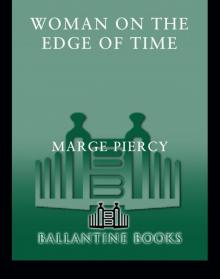 Woman on the Edge of Time
Woman on the Edge of Time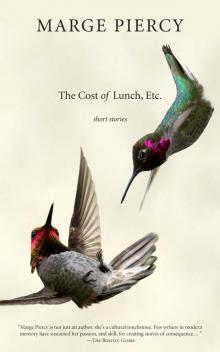 The Cost of Lunch, Etc.: Short Stories
The Cost of Lunch, Etc.: Short Stories Made in Detroit: Poems
Made in Detroit: Poems Sleeping With Cats
Sleeping With Cats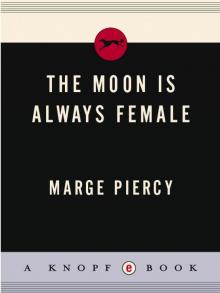 Moon Is Always Female
Moon Is Always Female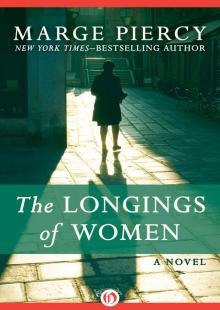 The Longings of Women
The Longings of Women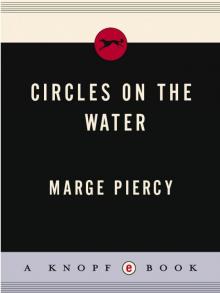 Circles on the Water
Circles on the Water Summer People
Summer People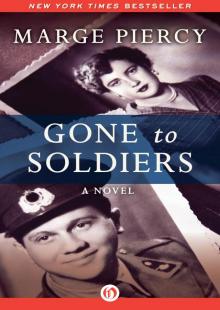 Gone to Soldiers: A Novel
Gone to Soldiers: A Novel The Hunger Moon: New and Selected Poems, 1980-2010
The Hunger Moon: New and Selected Poems, 1980-2010 Vida
Vida Fly Away Home
Fly Away Home He, She and It
He, She and It So You Want to Write
So You Want to Write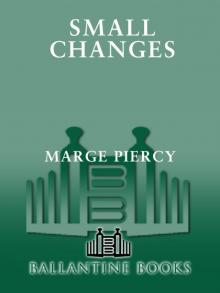 Small Changes
Small Changes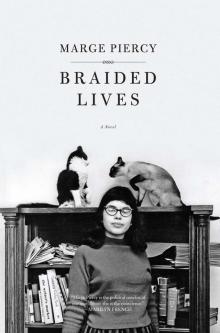 Braided Lives
Braided Lives Lord Valentine's Castle
Lord Valentine's Castle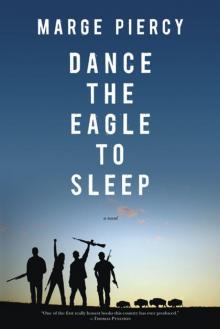 Dance the Eagle to Sleep
Dance the Eagle to Sleep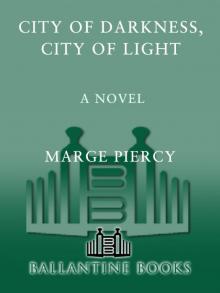 City of Darkness, City of Light
City of Darkness, City of Light The High Cost of Living: A Novel
The High Cost of Living: A Novel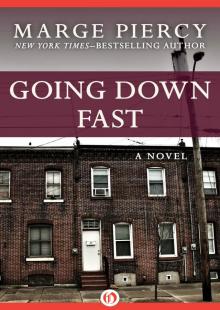 Going Down Fast: A Novel
Going Down Fast: A Novel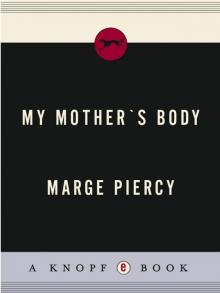 My Mother's Body
My Mother's Body Storm Tide
Storm Tide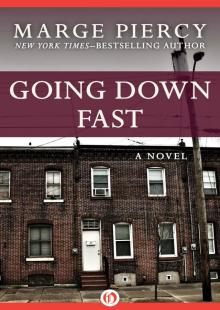 Going Down Fast
Going Down Fast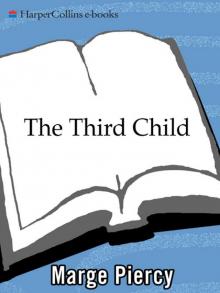 The Third Child
The Third Child The Hunger Moon
The Hunger Moon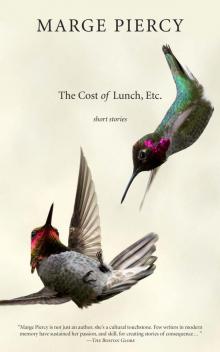 The Cost of Lunch, Etc.
The Cost of Lunch, Etc.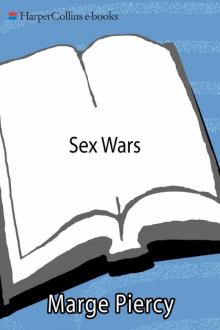 Sex Wars
Sex Wars The High Cost of Living
The High Cost of Living Made in Detroit
Made in Detroit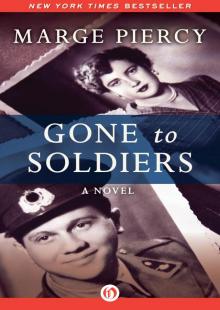 Gone to Soldiers
Gone to Soldiers